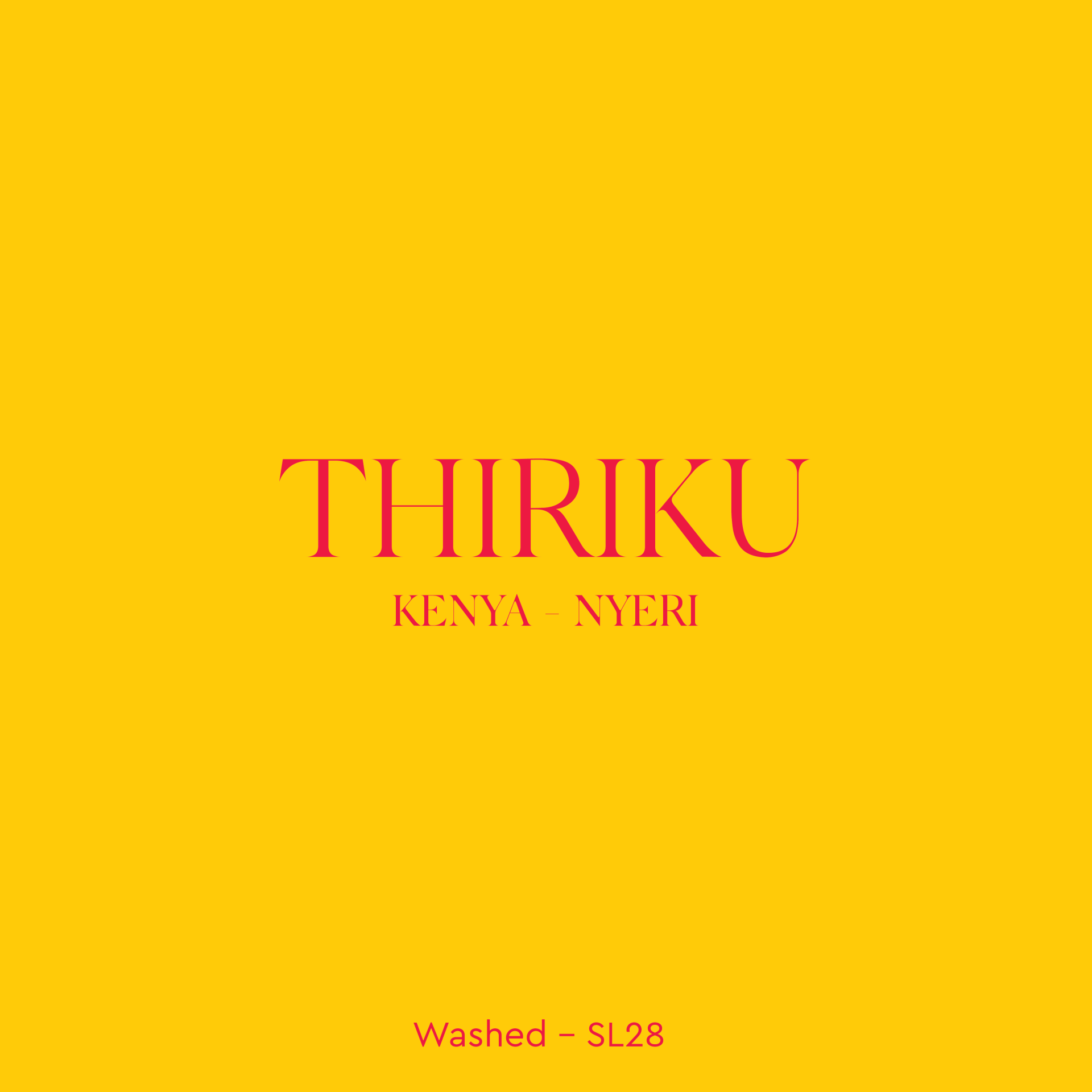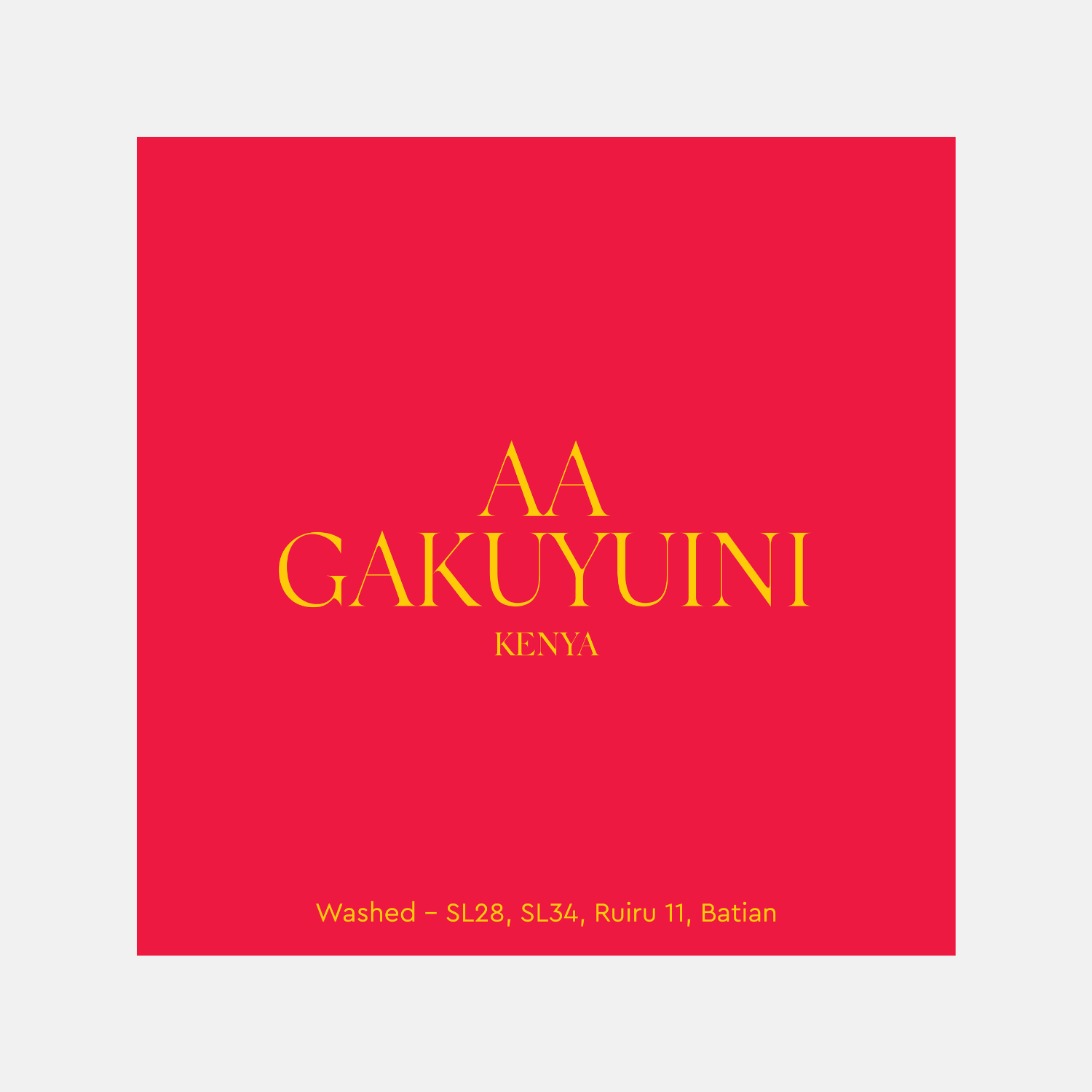All
Thiriku - Kenya
€15.30
Thiriku Kenya. SL28. Washed.
Every bean has a story
Thiriku comes from Thiriku Cooperative located in Tetu constituency within Nyeri County.
The Thiriku locals have recently returned to farming coffee. In the past, disappointed by the poor prices coffee was fetching, a majority of the farmers had started uprooting their coffee plantations and replacing them with other lucrative crops. But, a promise of receiving 1 USD every season for their crop, farmers have started rehabilitating their farms and venturing back to coffee farming.
Thiriku Cooperative is very proud by the achievements in past years:
Currently, the farmers are producing a minimum of one kilogram per coffee bush. However, with the adherence to the guidelines recommended by an agronomist, production is projected to increase to approximately 10 kilograms per coffee bush.
In Kenya small scale holder farmers are responsible for about 70% of the Kenyan coffee production. They deliver coffees from their wet mills to washing stations (factories) under Farmers Cooperative Societies management in Central Kenya.
During the harvest, producers selectively handpick the ripest cherries, and then deliver them to the cooperative’s wet mill on the same day. They hand sort cherries prior to pulping and separate damaged and under-ripe cherries out from the red, ripe lots. They then pulp the cherries with a disc machine to remove the external fruit. The coffee next goes through fermentation for 16 to 24 hours to breakdown the exterior mucilage. After fermentation, the producers wash the coffee in clean, fresh river water to remove all traces of mucilage before delivering it through sorting channels to dry on raised beds for 21 days.
Kenya mainly produces fully washed coffees, and is considered by many as the world’s number one quality producer. A great Kenyan coffee can compete with any of the expensive and sought-after coffees in the specialty market. The combination of terroir, varieties and post-harvest processing makes Kenyan coffees truly exceptional!
You can enjoy our other Kenyan coffee - AA Gakuyuini - as a drip bag too! Check it out here
Every bean has a story
Thiriku comes from Thiriku Cooperative located in Tetu constituency within Nyeri County.
Thiriku Cooperative
The Thiriku locals have recently returned to farming coffee. In the past, disappointed by the poor prices coffee was fetching, a majority of the farmers had started uprooting their coffee plantations and replacing them with other lucrative crops. But, a promise of receiving 1 USD every season for their crop, farmers have started rehabilitating their farms and venturing back to coffee farming.
Thiriku Cooperative is very proud by the achievements in past years:
- Better payment: farmers receive a min of 1 USD per kilogram of red cherries. An average 1 USD wil be paid to the factory (washing station) to run operations.
- An Agronomist is tasked to guide the Thiriku coffee farmers to applying proper crop husbandry to increase quality and quantity
Currently, the farmers are producing a minimum of one kilogram per coffee bush. However, with the adherence to the guidelines recommended by an agronomist, production is projected to increase to approximately 10 kilograms per coffee bush.
Kenyan coffees
In Kenya small scale holder farmers are responsible for about 70% of the Kenyan coffee production. They deliver coffees from their wet mills to washing stations (factories) under Farmers Cooperative Societies management in Central Kenya.
During the harvest, producers selectively handpick the ripest cherries, and then deliver them to the cooperative’s wet mill on the same day. They hand sort cherries prior to pulping and separate damaged and under-ripe cherries out from the red, ripe lots. They then pulp the cherries with a disc machine to remove the external fruit. The coffee next goes through fermentation for 16 to 24 hours to breakdown the exterior mucilage. After fermentation, the producers wash the coffee in clean, fresh river water to remove all traces of mucilage before delivering it through sorting channels to dry on raised beds for 21 days.
Kenya mainly produces fully washed coffees, and is considered by many as the world’s number one quality producer. A great Kenyan coffee can compete with any of the expensive and sought-after coffees in the specialty market. The combination of terroir, varieties and post-harvest processing makes Kenyan coffees truly exceptional!
You can enjoy our other Kenyan coffee - AA Gakuyuini - as a drip bag too! Check it out here
Read More
Read Less
Tasting notes
Imagine redcurrant jam! A vibrant and fruit-forward cup with layered acidity and sweetness. Bright redcurrant and gooseberry lead the way, followed by deeper stone fruit and savory ripe tomato. The syrupy body carries through to a clean, zesty pink grapefruit finish, balanced by subtle cacao nib undertones.
Recipe for filter
Grounded coffee: 15g
Water: 250ml
Total Brew Time: 2:00 - 2:30
Temperature: 92-93 Celsius
Aged Best Use: Between 5-20 days
Imagine redcurrant jam! A vibrant and fruit-forward cup with layered acidity and sweetness. Bright redcurrant and gooseberry lead the way, followed by deeper stone fruit and savory ripe tomato. The syrupy body carries through to a clean, zesty pink grapefruit finish, balanced by subtle cacao nib undertones.
Recipe for filter
Grounded coffee: 15g
Water: 250ml
Total Brew Time: 2:00 - 2:30
Temperature: 92-93 Celsius
Aged Best Use: Between 5-20 days
Read More
Read Less
Beans:
Whole Beans 250g
- Whole Beans 250g
- Ground for Espresso 250g
- Ground for Filter - Hand Brew 250g
- Ground for Filter - Cafetiere 250g
1
2
3
4
5
6
7
8
9
10

